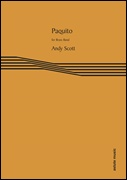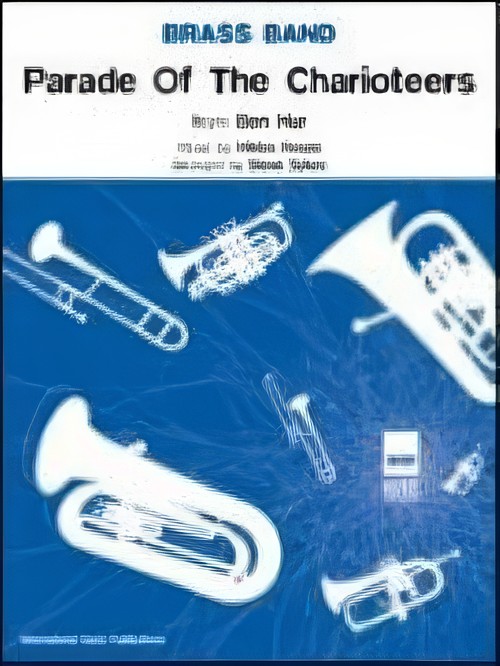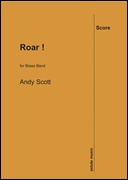Results
-
£139.99
Missa Brevis Brass Band (Score & Parts)
Missa Brevis is a major work for choir and brass band for performance in church or in the concert hall. For this mass, there are many performance possibilities depending on the musicians available. In addition to the standard orchestration of choir and band a brass quartet can also play the choral parts. For this it is desirable for the brass quartet to be positioned separately from the rest of the band (on a gallery, for example), so that the idea of two choirs is heard. It is also possible to perform the work with brass band and organ. A truly flexible religious masterpiece. 20:00
Estimated dispatch 7-14 working days
-
 £59.95
£59.95MOORSIDE SUITE (Brass Band Set - Score and Parts) - Holst, Gustav
Score and Parts. 2010 National Championships Area Qualitying Contest - 1st Section. This work was first heard at the Crystal Palace Brass Band Contest in 1928 for which it had been specially written.
Estimated dispatch 7-14 working days
-
 £15.00
£15.00PAQUITO (Cornet Section feature with Brass Band Score) - Scott, Andy
Brass Band score only. 'Paquito' pays homage to the brilliant composer/saxophonist/clarinetist Paquito D'Rivera. It is a fast salsa, based around a two-three clave pulse, and is virtuosic showcase for the cornet section. Dur: 3:00
Estimated dispatch 7-14 working days
-
 £34.99
£34.99Parade of the Charioteers (Brass Band - Score and Parts) - Rozsa, Miklos - Sykes, Steve
Miklos Rozsa's score to the Hollywood epic Ben Hur is powerful and dramatic. This brass band arrangement by Steve Sykes of the Parade of the Charioteers makes for a great concert opener.Suitable for Advanced Youth/3rd Section Bands and aboveDuration: 10.00
Estimated dispatch 7-14 working days
-
 £95.00
£95.00Penlee (Brass Band - Score and Parts) - Dobson, Simon
2013 Finals of the National Brass Band Championships of Great Britain - 3rd SectioTo some, the tragic story of the Penlee lifeboat, Solomon Browne, would need no introduction, and to some the pain felt is still very much a reality. The composer, born just a few weeks before that fateful night on the 19th December 1981, has created this work as a musical homage to the bravery of the souls who lost their lives and has dedicated it to their memory.Penlee was commissioned by the Cornwall Youth Brass Band using funds bequeathed by Michael Pickett. The first performance was given by the Cornish Youth Brass Band, conducted by Ian Porthouse, at St. Michael's Church, Newquay, on 30th December 2008.Penlee has been voted into the Classic FM Hall of Fame 2011 at No.106. Not only is it the first time a brass work has been featured in the Hall of Fame, but it was also the highest new entry.The work has subsequently been recorded by the Leyland Band, conducted by Jason Katsikaris, on the CD entitled Penlee.Suitable for Advanced Youth/3rd Section Bands and aboveDuration: 13:30
Estimated dispatch 7-14 working days
-
 £17.99
£17.99Penlee (Brass Band - Score only) - Dobson, Simon
2013 Finals of the National Brass Band Championships of Great Britain - 3rd SectionTo some, the tragic story of the Penlee lifeboat, Solomon Browne, would need no introduction, and to some the pain felt is still very much a reality. The composer, born just a few weeks before that fateful night on the 19th December 1981, has created this work as a musical homage to the bravery of the souls who lost their lives and has dedicated it to their memory.Penlee was commissioned by the Cornwall Youth Brass Band using funds bequeathed by Michael Pickett. The first performance was given by the Cornish Youth Brass Band, conducted by Ian Porthouse, at St. Michael's Church, Newquay, on 30th December 2008.Penlee has been voted into the Classic FM Hall of Fame 2011 at No.106. Not only is it the first time a brass work has been featured in the Hall of Fame, but it was also the highest new entry.The work has subsequently been recorded by the Leyland Band, conducted by Jason Katsikaris, on the CD entitled Penlee.Suitable for Advanced Youth/3rd Section Bands and aboveDuration: 13:30
Estimated dispatch 7-14 working days
-
 £59.95
£59.95PSALMS AND ALLELUIAS (Brass Band Set - Score and Parts) - Wilby, Philip
Score and Parts. National Brass Band Championships of Great Britain Section 2 Finals 2010 .
Estimated dispatch 7-14 working days
-
 £15.00
£15.00ROAR! (Brass Band Score) - Scott, Andy - Fieldhouse, Jim
Brass Band score only. Roar! is a short punchy piece, with minimalist tendencies combined with jazz influenced harmonies. A bold opening statement gives way to a theme that develops with added layers of texture. These two ideas form the basis of the structure of Roar!. Dur: 4:00
Estimated dispatch 7-14 working days
-
 £55.00
£55.00ROYAL MILE SUITE, A (Brass Band Set - Score and Parts) - Fernie, Alan
Score and Parts. National Brass Band Championships of Great Britain Section 4 Finals 2010 .
Estimated dispatch 7-14 working days
-
 £85.00
£85.00The Alchymist's Journal (Brass Band - Score and Parts) - Hesketh, Kenneth
The Alchymist's Journal (Variants for Brass Band) was commissioned by Faber Music Band Consultant Paul Hindmarsh in 2001, with the support of the Brass Band Heritage Trust, as a substantial concert/contest challenge that would be within the compass of the country's most able youth and first section bands. It received its first performance in January 2002, by Black Dyke Band under Nicholas Childs, as part of the Royal Northern College of Music Festival of Brass.Since its original publication, composer Kenneth Hesketh has made a number of revisions to the work. Most of these were included in the recording made by Foden's Band conducted by Bramwell Tovey. This definitive new edition, including all the composer's revisions, has been specially prepared for the 2015 National Brass Band Championships of Great Britain and is the text that all bands performing were required to use.Suitable for 1st Section Bands and aboveDuration: 12 minutes
Estimated dispatch 7-14 working days
